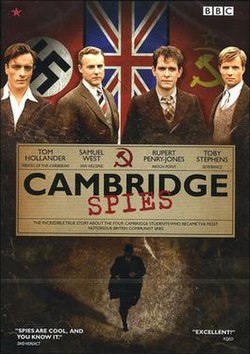| Cambridge Spies | |
|---|---|
 | |
| Genre | Historical drama |
| Written by | Peter Moffat |
| Directed by | Tim Fywell |
| Starring | Tom Hollander Toby Stephens Samuel West Rupert Penry-Jones |
| Composer | John Lunn |
| Country of origin | United Kingdom |
| Original language | English |
| No. of episodes | 4 |
| Production | |
| Executive producers | Laura Mackie Gareth Neame Sally Woodward Gentle |
| Producer | Mark Shivas |
| Running time | 60 minutes |
| Original release | |
| Network | BBC Two |
| Release | 9 May – 30 May 2003 |
Cambridge Spies is a four-part British drama written by Peter Moffat and directed by Tim Fywell, [1] that was first broadcast on BBC Two in May 2003 and is based on the true story of four young men at the University of Cambridge who are recruited to spy for the Soviet Union in 1934.